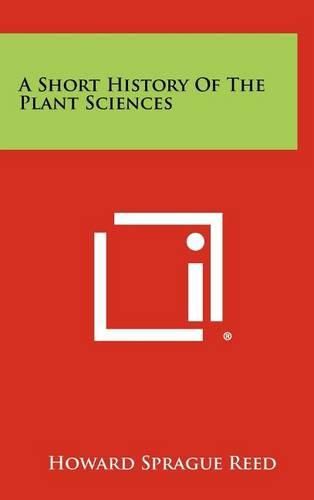Readings Newsletter
Become a Readings Member to make your shopping experience even easier.
Sign in or sign up for free!
You’re not far away from qualifying for FREE standard shipping within Australia
You’ve qualified for FREE standard shipping within Australia
The cart is loading…






""A Short History of the Plant Sciences"" by Howard Sprague Reed is a comprehensive overview of the development of botanical knowledge from ancient times to the present day. The book covers the major milestones in the history of plant sciences, including the contributions of early civilizations such as the Egyptians, Greeks, and Romans, as well as the advances made during the Renaissance and Enlightenment periods. It also explores the emergence of modern botany and the impact of scientific discoveries on agriculture, medicine, and ecology. The author highlights the key figures and their contributions to the field, including Linnaeus, Darwin, and Mendel, and examines the role of botanical gardens, herbaria, and other institutions in advancing plant research. The book is written in a clear and accessible style, making it an ideal resource for students, scholars, and anyone interested in the history of science.""This scarce antiquarian book is a facsimile reprint of the old original and may contain some imperfections such as library marks and notations. Because we believe this work is culturally important, we have made it available as part of our commitment for protecting, preserving, and promoting the world's literature in affordable, high quality, modern editions, that are true to their original work.
$9.00 standard shipping within Australia
FREE standard shipping within Australia for orders over $100.00
Express & International shipping calculated at checkout
""A Short History of the Plant Sciences"" by Howard Sprague Reed is a comprehensive overview of the development of botanical knowledge from ancient times to the present day. The book covers the major milestones in the history of plant sciences, including the contributions of early civilizations such as the Egyptians, Greeks, and Romans, as well as the advances made during the Renaissance and Enlightenment periods. It also explores the emergence of modern botany and the impact of scientific discoveries on agriculture, medicine, and ecology. The author highlights the key figures and their contributions to the field, including Linnaeus, Darwin, and Mendel, and examines the role of botanical gardens, herbaria, and other institutions in advancing plant research. The book is written in a clear and accessible style, making it an ideal resource for students, scholars, and anyone interested in the history of science.""This scarce antiquarian book is a facsimile reprint of the old original and may contain some imperfections such as library marks and notations. Because we believe this work is culturally important, we have made it available as part of our commitment for protecting, preserving, and promoting the world's literature in affordable, high quality, modern editions, that are true to their original work.